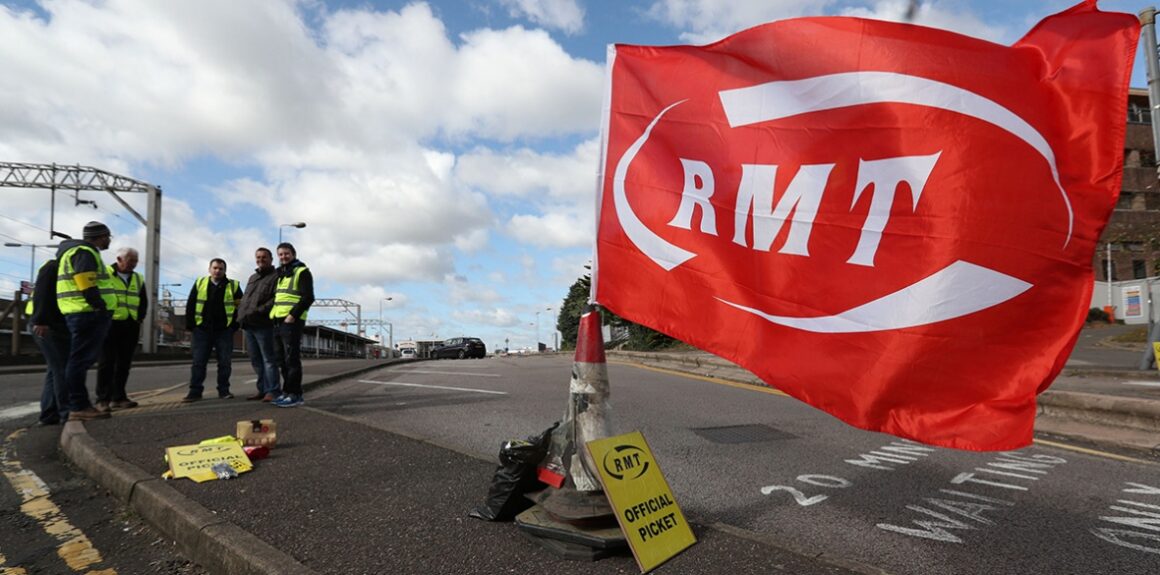By Dan O’Rourke
The cost of living crisis has struck the global working class. The speed and scale of the inflation crisis is almost unprecedented. Not since the 1970s have rising prices escalated this quickly in so many countries all at once.
At the same time as people are struggling to make ends meet, bosses and billionaires are raking in record profits. The one of course being directly related to the other.
This shift in living conditions has forced people to take to the streets in protests and strikes, particularly by those ‘essential workers’ who sacrificed so much during the pandemic.
In order to tame inflation, the only tool left in the ruling class’ tool box will be to force a recession. Central banks around the world are hiking interest rates. This shock therapy approach will stem the flow of money into the system by making business loans more expensive, but it is the working class which will pay the price and suffer.
Learning from struggles
With increasing inflation and the looming threat of recession, it is important for workers to learn from ongoing struggles around the world – all the better to engage in their own ones.
Over the past year, Amazon and Starbucks workers in the US, and Unite and RMT workers in Britain have been the focus of much attention. A fighting approach from the leadership and the success of the new unions has inspired both headlines and other workers.
This militancy is particularly apparent in the approach taken by Chris Smalls, the leader of the Amazon Labor Union (ALU), Unite’s new general secretary Sharon Graham, and the RMT’s general secretary Mick Lynch. Although far from perfect, members at other unions would do well to vote for leaders with a similar fighting stance.
A backlog of labour disputes following lockdown inactivity, workers being told they are ‘essential’ without any material recognition, the rising costs of living, plus the brutal unfairness of the rich getting richer, have all combined to create a storm of labour unrest. This article takes a global tour of ongoing disputes, sector by sector.
Retail and hospitality
Joining the surge of Starbucks stores unionising on the high streets of the US is the first Apple store to be unionised. The store in Maryland could be the first of many. Stores in New York and Kentucky have announced campaigns, while another in Atlanta, Georgia, withdrew from the fight citing union-busting from Apple as the cause.
Prior to unionisation, bosses at the grotesquely profitable corporation had planned to attack their workers with loss of pay, loss of benefits like sick leave, and loss of promotions. The plans were revealed in a leaked memo.
The pay of the retail workers contrasts grotesquely with the massive profits at Apple, and is likely to fan the flames of unionisation at the corporation. Workers created profits of $167 billion for Apple shareholders in the twelve months between March 2021 and March 2022 — a 29% increase on the previous year.
Also initiating their unionisation campaign are workers at a Chipotle outlet in Maine. The Mexican food restaurant has over 3,000 locations in the US and had a profit of €1.7 billion between March 2021 and March 2022 — a 47% increase. Given the general upward trend of corporate profits, it seems inflation is only affecting those least able to afford it: low-paid workers.
Healthcare
Bosses and capitalist politicians cheered and clapped for nurses and healthcare workers in all corners of the world as the pandemic raged. Just as universal as the ‘moral support’ was the lack of meaningful pay, benefits, or improvements in working conditions. Hailed as the heroes of the pandemic, healthcare workers are stepping forward again to fight against low pay and the underfunding of health services.
A nurses strike at university hospitals in the province of North Rhine-Westphalia in Germany is entering its ninth week. Understaffing is causing severe issues for patients. Speaking to a local news outlet, one nurse, Katharina Kuckeland, said: “The lack of time means that I have to let people die alone… I have to leave people in their faeces because I can’t be in two places at once.” The strike enjoys strong support among patients and the broader public. It is important that union members pressure their union to fight for real gains, and organise independently if needs be.
In the US, healthcare workers have initiated at least a dozen strikes since the start of the year. As well as better conditions in order to improve patient care, better wages are also a key part of demands in the US. In New Jersey on 24 June, 350 healthcare workers ended a month-long strike after winning pay increases across the board, as well as significant improvements to scheduling and working conditions.
In Turkey, ten medical unions are campaigning for much needed improvements to pay and conditions. The unions combined forces and went on a one-day strike on 15 June. During the strike, hospitals across the country remained empty except for emergency procedures. As well as salary increases, there are demands for better protection against violence while working. Last year 316 workers lost their lives.
Here, SIPTU members at the Irish Wheelchair Association are striking for better pay after a disgraceful 14-year pay freeze. Workers at the private charity do the same work as those employed directly by the government, but are paid considerably less. The IWA is blaming the government for its underfunding, while the government is absolving itself of responsibility because the IWA is not a public sector organisation. This neo-liberal catch 22 is the same state of affairs for many workers providing essential services while employed by an NGO.
Airlines
Some of the hardest hit workers during and after Covid were airport and airline workers. Starting off with low pay before the pandemic, airline workers saw their meagre incomes halted as planes were grounded. Bosses in the air travel industry used Covid as an excuse to cut pay and conditions.
The massive surge in air travel following the lifting of restrictions, even as the pandemic continues, has pushed angry workers at almost a dozen airlines and airports into taking industrial action across Europe. In most cases workers are forcing the union leadership into negotiations with management.
In Europe alone, a not exhaustive list of airlines where workers are striking include Ryanair, Air France, Transavia, Brussels Airlines, EasyJet, SAS and KLM.
A well organised and militant labour force in the air travel industries could win considerable concessions for the working class. Former US president Ronald Reagan feared exactly this when he viciously attacked PATCO, the air traffic controllers’ union, at the onset of the neo-liberal era.
Shipping and docking
In recent weeks, the German ports of Hamburg, Bremerhaven, Emden and Wilhelmshaven were brought to a standstill when more than 12,000 dockers with the union Verdi went on strike. This is the first of its kind in decades, and was a shot across the bows of the bosses to demonstrate the power of the workers as negotiations for better pay and conditions proceed.
Amidst severe supply chain log jams rippling across the world, logistics workers hold significant power, not least dock workers.
In the US, all eyes are on the negotiations between the powerful International Longshore and Warehouse Union (ILWU) and bosses at the Pacific Maritime Association (PMA). There has been a joint statement that strikes or lockouts will not be a feature.
The contract officially expired on 1 July. Talks have been extended, raising the stakes and the pressure. The ILWU is representing workers at 29 ports along the west coast of the US
Unfortunately, leadership at the ILWU has ruled out their most effective weapon, the strike, and has apparently not communicated with the rank and file, while engaging in back-room deals with the bosses and the Biden administration.
An organised, worker-led and militant approach is needed
Over decades of neoliberal austerity, gains made by the organised working class have been clawed back by the corporate elite and their lackeys in government. Workers, oppressed groups, and the planet have suffered as a result.
There is a decisive clash of interests between capitalists and workers. The capitalists are ensuring we pay the price for the crises of their system, and workers urgently need to organise to resist this every inch.
We need a trade union movement that fights and organises such struggles — that organises all workers for decent pay and conditions. This is something that is sorely lacking in the south of Ireland, and has been for decades. Consequently, unions have become increasingly seen as irrelevant as its leaders cosy up to the bosses whom they ridiculously regard as “partners”.
There are over 500,000 union members in the Republic of Ireland — a potentially powerful force (with much potential to grow) if it were mobilised on the streets and in the workplaces.
The rebuilding of a strong workers’ movement should also be linked with the building of a new political movement of the working class in this country, based on the ideas of socialism — where the wealth that workers produce is owned and democratically controlled by the working-class majority, and planned in the interests of all. Our families, our friends, our communities and our environment cannot afford to accept the rule of this parasitic capitalist system any longer.
As Mick Lynch’s hero James Connolly once wrote: “Our demands most modest are, we only want the Earth.”












